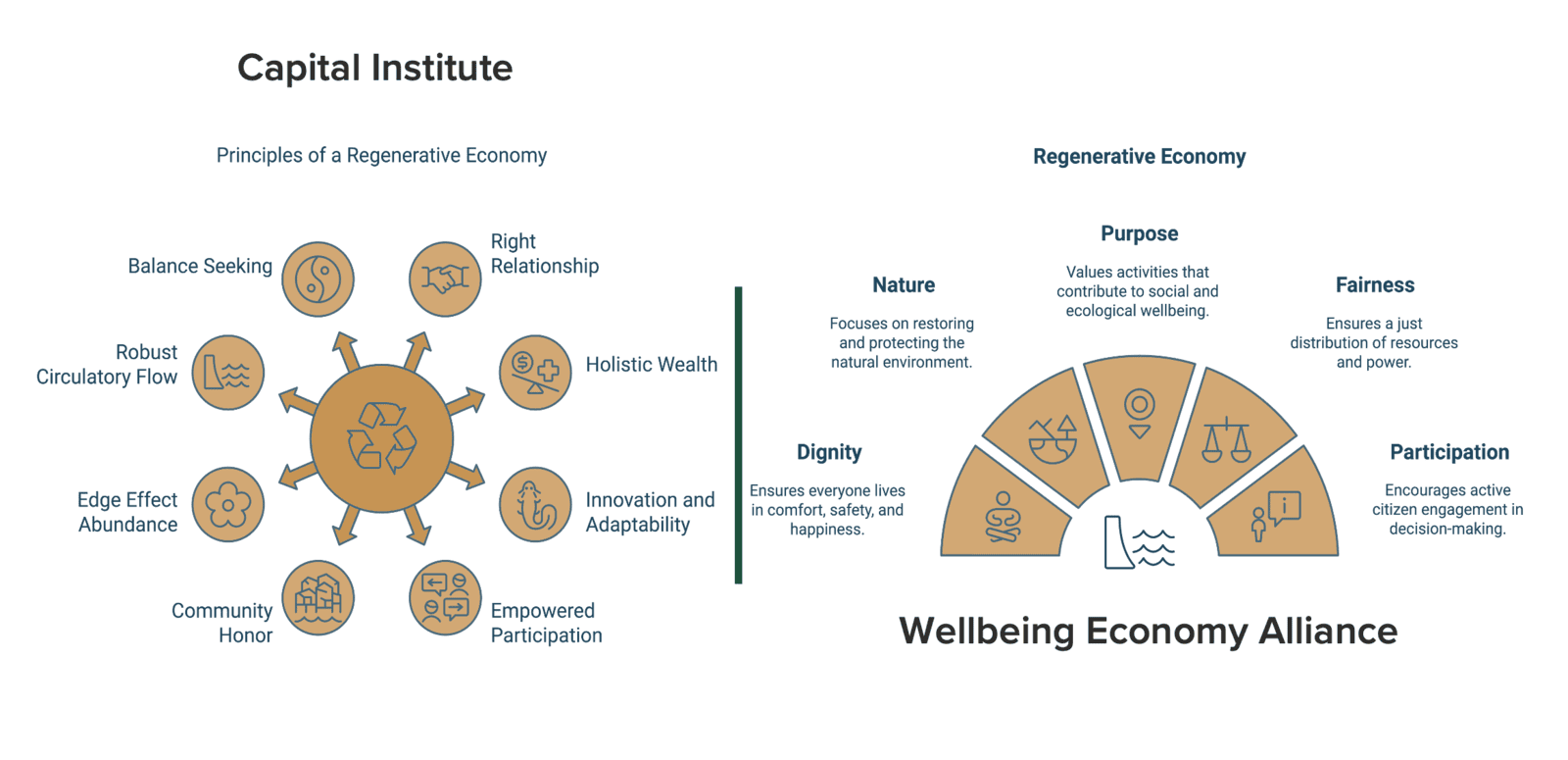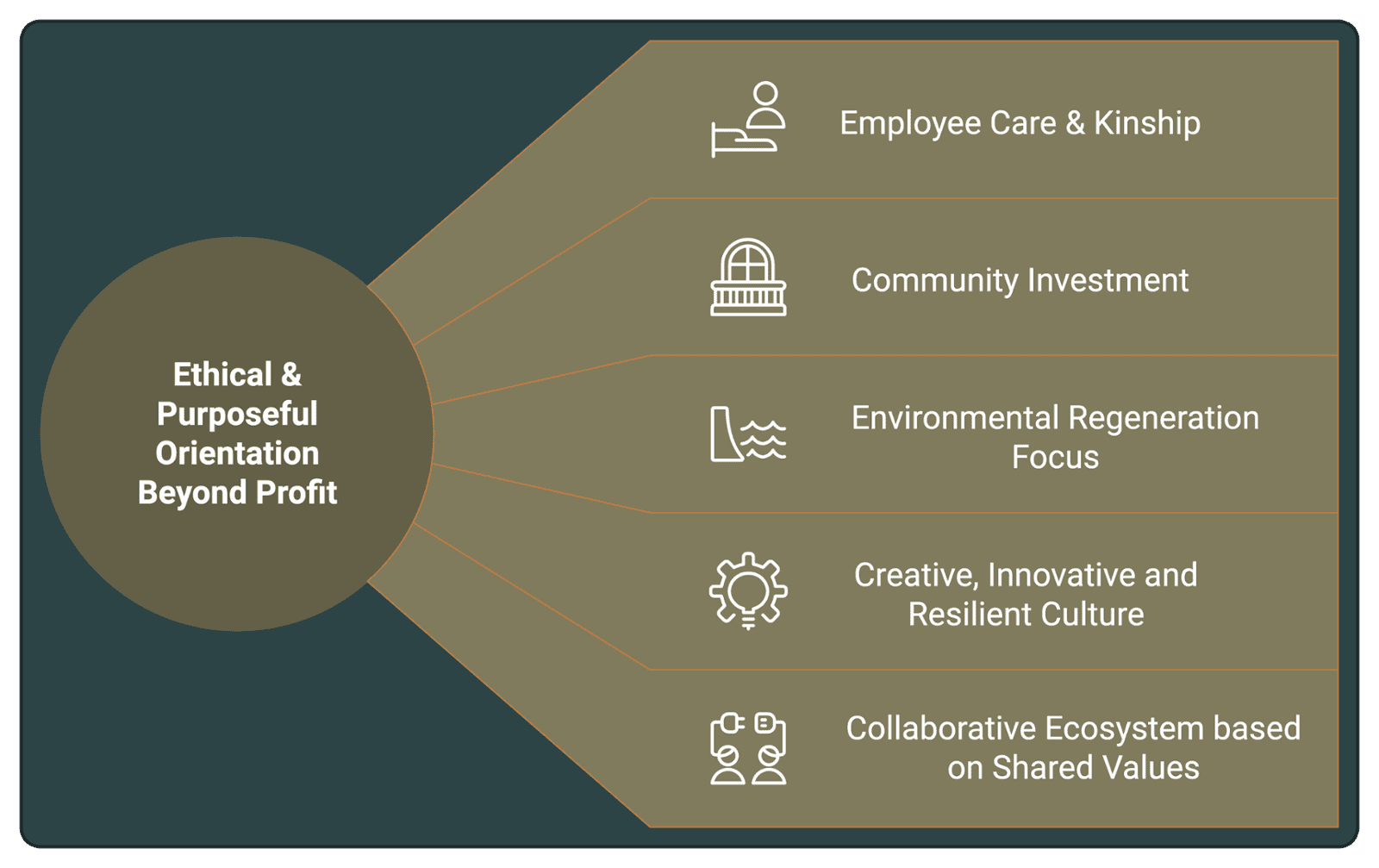In Spirit, by Design, in Practice

Highlights:
- Core aspects of a regenerative economy
- Regenerative business orientation/attributes
- Transnational Localism is Zoho’s driving business philosophy and orientation
- Employee care and kinship at Zoho
- Community investment is a vital facet of Zoho’s Transnational Localism
- Zoho takes environmental sustainability seriously, in keeping with its regenerative ethos
- Creative, resilient and adaptive depends on the culture, as Zoho exemplifies
- The ‘LATAM’ team faithfully reflects Zoho’s ethical orientation and the five attributes
- Transnational Localism guides Zoho’s expansion across the Middle East and Africa
- Transnational Localism is Zoho’s expression of purposeful collaboration through shared values
- Unique among technology companies, Zoho is regenerative in spirit, by design and in practice
Setting the scene
Zoho Corporation, founded in 1996, is an extraordinary company. A global technology business quite unlike any other. To quote the inspirational R. Buckminster Fuller, our collective endeavour as humans on this planet should and must be:
We will discover that Zoho matches this calling in India, where it is headquartered, and, progressively, wherever it operates.
Many years ago, I read about the two-hundred-year-old chocolatiers Cadbury and Rowntree of England. Both had, for their time and by today’s allegedly more enlightened standards, an extraordinary concern for their employees. The founders were devout Quaker Christians who took their obligations seriously, living their faith, not simply reciting prescribed ritualistic prayers. They built housing and schools for the workforce and their families. Their faith inspired the highest standard of ethics that permeated their daily lives, most notably in the workplace and their equitable business dealings with others. I wondered why most businesses today don’t treat their employees with the same concern for their wellbeing but only as ‘human resources’, a term I find almost as inhumane as ‘human capital’.
Zoho sparked my deep interest in Regenerative Business
In the summer of 2022, I attended a two-day conference hosted by Zoho in Austin, Texas. Unusually, for an IT analyst-only event, before telling us about Zoho’s latest software innovations for businesses, the Chief Strategy Officer, Vijay Sundaram, who projects kindness, humility and wisdom, told us about the company’s business philosophy. It is distinctly different from any other IT corporation I’ve encountered. It reminded me so much of those two Quaker companies, Cadbury and Rowntree.
As I later discovered in a one-to-one meeting with Sridhar Vembu, co-founder and CEO, in early 2024 in McAllen, Texas, his Hindu faith inspires the firm’s ethical behaviours. I mention this because a higher level of consciousness regarding ethical business is required, irrespective of religious beliefs or practices. Ethical business is non-dualistic. It recognises the mutuality and interdependence between a company’s owners and leaders, employees, ecosystem partners, and communities. At its best, a symbiotic relationship where the health of the whole takes precedence over the individual. The antidote to neoliberal’s zero-sum game of ‘us’ at the expense of ‘them’.
In February 2023, along with a dozen other IT industry analysts, Zoho flew us to India to give us a first-hand appreciation of Zoho’s culture—the Truly Zoho Tour. We spent a week at their Chennai HQ and then two days in a remote village near Tenkasi, Southern India, to see the local Kalaivani Kalvi Mayan (KKM) School for young children and the surrounding organic farm, with the Western Ghats mountain range providing a majestic backdrop.
I’ll return to this later, but first, let’s examine what it means to be a regenerative business.
Core aspects of a regenerative economy
Most companies are naturally extractive, especially those answerable to the stock market. The most obvious are mining and energy companies, which, by definition, extract resources from the Earth, refine them, and sell them to others who use the materials for their own production needs. But no sector is immune from extractive impacts. Companies choose how profits will be made and what they will do with them. Those answerable to third-party shareholders can choose to invest in innovation, employee education or boost their earnings by playing the market through stock buy-backs to increase share prices. The latter, often the default, starves companies of innovation investment and sometimes victimises employees through tactical redundancies to inflate profits. This is tempting for CEOs whose remuneration heavily depends on their company’s stock price. Another common characteristic of extractive companies is their failure to consider their business’s broader environmental and societal impacts. The Anglo-American economist Kenneth E. Boulding (1910 -1993) put it like this[1]:
‘’Anyone who believes exponential growth can go on forever on a finite planet is either a madman or an economist.’’
Two organisations identify attributes of a regenerative economy
The Wellbeing Economy Alliance (WEALL) and the Capital Institute’s perspectives on regenerative economy characteristics serve as a proxy for evaluating a company’s regenerative capabilities - See Figure 1.

Figure 1: Two Views of Regenerative Economics. Source: author’s interpretation + Napkin AI graphic
Regenerative businesses share many characteristics, as identified by the founders of WEALL and John Fullerton, founder of Capital Institute.
WEALL’s version focuses more explicitly on human and environmental aspects, addressing human dignity, restoring nature, being purposeful socially and ecologically, and being fair and participative. The diagram is self-explanatory, although less explicit than the eight regenerative principles proposed by the Capital Institute.
Capital Institute’s eight principles are more technical and prescriptive and require further explanation.
- The ‘right relationship’ idea recognises that we are interconnected with all life; therefore, any damage caused has negative consequences that impact that web of life.
- Wealth is also considered holistically, beyond money and materials, and includes the community’s well-being and the environment that contributes to it.
- Innovation and adaptability are essential as they foster resilience in an environment of constant and rapid change.
- Empowered participation means everyone has a voice and a sense of agency.
- Honouring the community means respecting local cultures and ensuring a positive local impact.
- Edge effect abundance involves cross-fertilising ideas and practices at the intersections within ecosystems, which can generate positive innovations that benefit the system as a whole.
- Robust circulatory flow of information, money, and resources to support value exchange and reuse of materials = the circular economy.
- Balance-seeking is about harmonising variables rather than placing one above the others at their expense. It’s about the entire system’s health, not a zero-sum approach.
To quote its founder:
'The fundamental definition of fitness in such an interdependent world is to act in ways that serve the long-term health of the whole.'
Applying regenerative economy characteristics to a regenerative business
Both Capital Institute and WEALL have described the characteristics of a regenerative economy. This wide-angle view includes companies, consumers, the financial system, governments, regulators, etc. Regenerative business is a subset of a regenerative economy. The following diagram has a narrower beam focused on the most relevant aspects that can be applied to regenerative businesses. An ethical purpose for the company beyond profit provides the starting point. This will likely be exhibited through five core attributes, outlined in Figure 2 below.

- Employees will be treated with care and respect and feel a deep kinship with their colleagues. They will be focused on a common purpose that brings meaning to their work lives, resulting in high levels of productive engagement. This echoes WEALL’s dignity maxim. It also massively contrasts with Gallup’s annual employee engagement surveys. In the US, engagement levels are low at only 33%, 23% globally, and 70% in best-practice organisations. Regenerative businesses are likely to score even higher levels.
- Wherever the regenerative company operates, it will invest in the local community, bringing opportunities and financial benefits and enhancing community well-being.
- Environmental regeneration will be vitally important to the company. This may be done directly by improving the environment of local communities or indirectly by customers using its products or services to contribute to environmental and social care.
- Regenerative companies reinvest a substantial share of profits in continuous innovation to ensure persistent customer relevance and perpetual resilience. Customers and other beneficiaries prize and value creativity. A culture that embraces creativity strengthens the organisation’s resilience and enhances the customer experience.
- Regenerative businesses operate within a wider ecosystem of customers, partners and suppliers. To fulfil its regenerative remit, co-creation partnerships must share the same ethical values. This supports Capital Institute’s eighth point about harmonising variables and balanced outcomes.
These five attributes support the characteristics of a regenerative economy WEALL and the Capital Institute advocate but narrowed down to the domain of regenerative business, a critical component of such an economy.
Having highlighted the most essential criteria, let’s see how Zoho stacks up.
Transnational Localism is Zoho’s driving business philosophy and orientation
It is rare to understand the motivation of a successful entrepreneur. Fortunately, Sridhar Vembu, a devout Hindu, is transparent and naturally humble—a far cry from some puffed-up Silicon Valley CEOs. After living in the US for over twenty years, he now lives in the village of Mathalamparai near Tenkasi, southern India. Vembu runs his global company with over 15,000 workers, serving over a hundred million users in 150 countries. He is connected by Zoho technology, although he travels regularly to Zoho customer and IT analyst conferences and to open new offices in Africa, Asia, Europe, Latin America and the US.
- Zoho School of Technology — to develop software engineers. A similar school also exists in rural Tenkasi ( to attract rural students).
- Zoho School of Design—for aesthetic design of products or communications, including video production and pure art.
- Zoho School of Business—which teaches all aspects of business management in a modern context.
- Zoho School for Advanced Study—where students can specialise in two of three subjects: technology, business or design. Many of the company’s software architects are graduates of this school.
- Zoho School for Graduate Studies - a boot camp to prepare students for further education at one of the other schools.
- MARUPADI (மறுபடி a Tamil word meaning ‘again’) is a school for women who have taken a career break, perhaps because of having children and now want to return to work.

- Build self-confidence
- Help each child find their purpose
- Teach them the self-discipline to achieve it.


Vembu wants India to become a manufacturing powerhouse for emerging technologies. Zoho has invested in several manufacturing companies.
- In 2021, Zoho took a 25% stake in the medical device manufacturing startup Voxelgrids. Voxelgrids was founded by Arjun Arunachalam in 2017. He is a former lead scientist at GE Corporation in the US. With help from Zoho, this small company of 33 employees manufactures lightweight MRI scanners that are more affordable than ones imported from the US or Europe. With this support, the company aims to sell its scanners worldwide.
- Electric agricultural utility vehicle manufacturer Boson Motors.
- - Yali Aerospace is run by Dinesh Baluraj and Anugraha, a husband-and-wife team that aims to revolutionise healthcare and disaster management through rapid-response drone networks.
- - Genrobotics was founded in 2017 and has manufactured the world’s first scavenger robot to clean sewer pipes safely. Around four million people across India risk their health and lives by manually cleaning sewage systems. The firm has also manufactured a robotic gait trainer using AI and VR to help patients recover their walking ability following injury.
- - Karuvi, a ‘smart’ power tool maker that provides intelligent feedback to help users improve their use of the tools.
- - Ultraviolet Automotive, a partnership with TVS Motor Company, an Indian motorbike manufacturer, to produce high-performance electric motorcycles.
- - Zentron Labs, automated AI visual inspection for automated quality control in agriculture, hi-tech manufacturing and metal forming.
- It has installed a Biogas plant to generate electricity. This also reduces food waste in landfills and the resulting methane emissions.
- At its headquarters in Chennai, it installed a sewage treatment plant, where wastewater is treated and used for flushing, gardening, and cooling tanks.
- Zoho IoT technologies are used for environmental monitoring of emissions, air and water quality and noise levels.
- It has instituted sustainable procurement policies ensuring that e-waste is recycled wherever possible, paper use is minimised through digital means, and materials sourcing favours suppliers with positive environmental practices.
- Support for women who suffered from domestic abuse. Her team provides an anonymous helpline using Zoho technology, enabling women to discuss their problems with third-party counsellors and reintegrate socially.
- Natural disaster relief following the devastating Category 5 Hurricane Otis in Acapulco in October 2023.
- Voluntary service at local orphanages and living communities for the elderly.
- Undoubtedly, Zoho is driven by an ethical purpose. For Vembu and his colleagues, it is less of a job and more of a sacred calling.
- -Employees are seen not as items on an accountant’s spreadsheet but as whole people with lives to live and individual callings to fulfil. Zoho schools nurture them, and the trust placed in them gives them the freedom to develop toward their calling. This generates a powerful bond of kinship within the company and local communities. Vembu expects that within five years, half of employees will work from smaller, rural centres. As he said:
'We want to keep people rooted in their towns and villages and provide world-class jobs in these places.'
- The company folds local cultures into its own, enriching both symbiotically. It invests significant resources in delivering on its transnational localism business philosophy, keeping its ears close to the ground of local communities and putting down roots within them.
- It recognises that nature and the environment are essential players within its broad ecosystem. It demonstrates its nurturing instincts through thoughtful energy, waste management investments, and organic farming, providing nourishing food for employees and students.-
- Creativity is prized, and an abundance of ideas and solutions to meet constantly evolving needs enables the company to maintain and increase its relevance to customers - a key reason it has been profitable every year and growing rapidly.-
- It has mastered the art of collaborative partnerships with communities and organisations that respect and share its values.
[1]: Quoted in: A Finer Future - Creating An Economy In Service To Life - L. Hunter Lovins, Stewart Wallis, Anders Wijkman, John Fullerton
[2]: Kelly, Marjorie. Wealth Supremacy: How the Extractive Economy and the Biased Rules of Capitalism Drive Today's Crises (p. 90). Berrett-Koehler Publishers. Kindle Edition.
